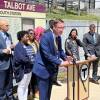If you ride the T, you know it's been a bad summer for the Massachusetts Bay Transportation Authority. Several lines are still operating on reduced service. There have been several dangerous and sometimes fatal accidents, crashes and derailments, and the MBTA is still under federal investigation.
Massachusetts Transportation Secretary Jamey Tesler and MBTA General Manager Steve Poftak testified before a legislative committee Monday, the first in a series of Beacon Hill hearings about the T’s ongoing issues. GBH News transportation reporter Bob Seay joined Morning Edition co-host Jeremy Siegel to explain what they said.
The T is struggling with hiring
The Federal Transit Administration has required the T to hire more employees, especially in the MBTA's Operations Control Center, which has been dangerously understaffed. The T has been running on weekend schedules during the week because it does not have enough dispatchers to safely oversee its fleet of trains.
“They are complying with deadlines to file corrective action plans, but [Poftak] acknowledged that hiring enough people has been challenging,” Seay said. “They have more than 800 job openings. They're hoping to hire 2,000 people in the next year or so to fill those positions.”
Poftak also confirmed what GBH reported last week:
Complying with the FTA directives has cost at least $300 million so far,
a number that will climb once the agency finishes its investigation next month.
Transit leaders defended a decision to keep a federal investigation quiet
Members of the state’s transportation committee wanted to know why it took the MBTA a month to reveal it had received a letter from the Federal Transit Administration informing the T of their safety investigation. Tesler said he was simply deferring to the federal agency.
“I think in the first few days of getting that letter, we were deferential to them as a federal agency with the resources to explain and answer questions as the scope of the thing, to speak to the scope of it,” Tesler said.
Lawmakers questioned whether there is political interference from the governor’s office
In May, three construction tool carts derailed on closed Blue Line tracks, extending a planned shutdown. Someone at the MBTA wrote a press release, sent to Gov. Charlie Baker’s office. But though the derailments affected service, the public was not informed of them.
“At that point, after there had been three derailments and there were now multiple extensions of the shutdown of the line, why wouldn't you want to just provide more details to the public about why the delay was happening?” Sen. Eric Lesser asked.
“At that point in time, it was my judgment that the critical factor was that there was an additional delay,” Poftak replied. “I think the point is being made right now that the construction cart derailments are of significant gravity, that they should be disclosed. And perhaps that was my my error at that moment in time.”
Poftak denied that political interference from the governor’s office played a role, but did not offer other explanations.
“I think, you know, there's always more detail we can potentially provide, right?” Poftak said. “I think at some point one makes a judgment, and I think we do coordinate, just so we have a standard set of alignment. But no, I don't view it as political interference.”
Rep. Bill Straus asked Tesler, the transportation secretary, if he had spoken with anyone at the governor’s office about the decision.
“I was concerned because in real time, we were extending a closure,” Tesler said. “And my interest was making sure that there was a plan to get the project done and that the project dates were accurate. That's the only conversations that I recall during that period of time and part.”
Poftak, too, added he could not recall any communication with the governor's office about what was to be released to the public. He said his focus was on getting the repairs done and the service restored.
The T set up a safety hotline for employees, and it’s getting more calls
In 2019, a three-member panel issued a highly critical report of the MBTA’s safety practices. Poftak, hired right around the same time, said the agency has been taking those recommendations seriously.
“The 2019 report was a definite wake up call that we needed to change the culture of the T,” Poftak said Monday. “We needed to listen to our employees. We needed to hear what they were telling us, and we needed to take action. And that's what we started to do in 2019. And I assure you, we are not done.”
Poftak also said an anonymous safety hotline was installed to make it easier for employees to report problems without fearing retribution.
“I'm pleased to report we're actually getting more calls about issues to the safety hotline than when we started,” Poftak said. “And I view that as a positive. I view that as employees feeling that when they report issues, these issues will get addressed.”
What’s next?
The next hearing, in September, will deal with either documents the lawmakers had requested from the MBTA and Department of Transportation for Monday’s hearing, which legislators said arrived too late for a proper review; or with the Federal Transit Administration's investigation, which will likely be completed in August.









